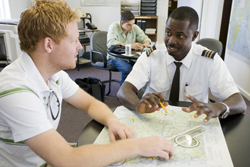As the calendar rolls into September, colleges across the country commence fall classes and students turn their attention to their studies. For pilots, basic and advanced flight training, and proficiency flights traverse the academic calendar, but if you are looking for career opportunities in the aviation industry, there are a variety of opportunities to add an aviation degree to your list of qualifications.
AOPA’s Aviation College Database allows you to choose your field of interest and your desired degree and search for colleges across the country that offer just what you’re looking for. You can select one or more of the career fields including air traffic control, aircraft maintenance, airport management, aviation business administration, aviation safety, engineering, maintenance management, and professional pilot. You may be surprised to see the number of results of the database search: Hundreds of colleges offer aviation programs, majors, and degrees.
There is a lot to consider in choosing an aviation college. The school’s academic and aviation programs are a primary consideration, but if you are going to be a resident student, give some thought to its aesthetic features—its location, student activities, and campus life. Here are a few more questions to ask:
- What degree programs are offered?
- What is the school’s graduate completion rate?
- What percent of the graduates are hired in the aviation industry?
- How big or small is the school?
- If it’s a flying program, what is the ratio of training aircraft to students?
- Is the airport on campus? If not, how long is the drive?
 AOPA offers a guide to aviation colleges and universities, which includes overview information, as well as helpful tips for choosing a program. Some colleges are tied directly to aviation companies and offer training in aircraft types that match those of a partnered airline or cargo company. Whether it’s a small college or a large university, with some research you can find an aviation program that’s just right for you.
AOPA offers a guide to aviation colleges and universities, which includes overview information, as well as helpful tips for choosing a program. Some colleges are tied directly to aviation companies and offer training in aircraft types that match those of a partnered airline or cargo company. Whether it’s a small college or a large university, with some research you can find an aviation program that’s just right for you.
The Airman Medical Certificate
If your goal is a flying career, it’s a good idea to visit an Aviation Medical Examiner early in the planning process. Although a medical certificate is not required until you solo, it’s important to know that you’ll qualify for whatever class of medical certification you’ll need in your career. A third class medical certificate is appropriate for student pilots, recreational pilots, and private pilots who fly for pleasure or personal business (but not for hire)—and student pilots need only a third class/student pilot certificate that serves as a combination pilot and medical certificate. But you’ll need a first or second class medical certificate to fly for hire. A second class is required for pilots who fly commercially in operations such as crop dusting, or carrying passengers or cargo for hire. And a first class medical is required for pilots who exercise airline transport pilot (ATP) privileges; that is, those flying scheduled airliners and other pilots whose employers require this level of certification. Most, if not all, university flight programs require at least a second class medical to begin training.
Funding your education
Getting a good education in any field is an investment—and with thoughtful research, one of the best you’ll ever make. There are ways to mitigate the cost through scholarships and loans. AOPA’s subject report on Aviation Scholarships provides leads for financial aid and we welcome you to explore these resources at your convenience. Keep in mind that there are application deadlines—so start looking into your options at least nine months ahead of time to be sure you don’t miss out on the opportunity to apply.



